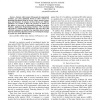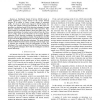31 search results - page 2 / 7 » Detecting Distributed Denial of Service (DDoS) Attacks throu... |
CORR
2010
Springer
13 years 5 months ago
2010
Springer
Botnets, which consist of thousands of compromised machines, can cause significant threats to other systems by launching Distributed Denial of Service (DDoS) attacks, keylogging, a...
ICC
2007
IEEE
13 years 11 months ago
2007
IEEE
—A Distributed Denial of Service (DDoS) attack is widely regarded as a major threat for the current Internet because of its ability to create a huge volume of unwanted traffic. ...
IADIS
2004
13 years 6 months ago
2004
Denial of Service (DoS) attacks and Distributed Denial of Service (DDoS) attacks accounted for more losses than Internet financial fraud and viruses combined (CSI/FBI 2003). The I...
DISCEX
2003
IEEE
13 years 10 months ago
2003
IEEE
The nature of the threats posed by Distributed Denial of Service (DDoS) attacks on large networks, such as the Internet, demands effective detection and response methods. These me...
LCN
2005
IEEE
13 years 11 months ago
2005
IEEE
—The shrew Distributed Denial of Service (DDoS) attacks are periodic, bursty, and stealthy in nature. They are also known as Reduction of Quality (RoQ) attacks. Such attacks coul...


